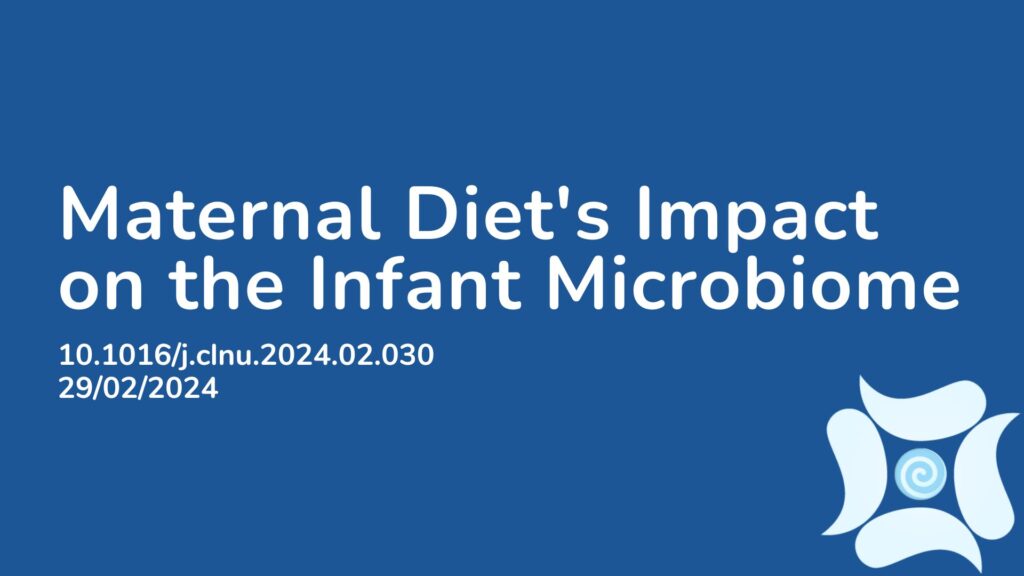Summary:
The first 1000 days from conception significantly shape immune, metabolic, and neurological development in both mother and infant, with microbial exposure playing a crucial role. Loss of key gut microbes contributes to non-communicable diseases by disrupting immune and metabolic regulation. Diet, particularly during pregnancy, strongly influences gut microbiota, impacting fetal and post-natal health. Modifying the maternal diet to support a healthy gut microbiome holds promise for long-term immune and metabolic health in infants. Prebiotic fiber supplements like fructo-oligosaccharide (FOS) and galacto-oligosaccharide (GOS) enhance the gut microbiome, promoting the growth of beneficial bacteria and regulating inflammation-reducing compounds such as short-chain fatty acids (SCFA). Maternal prebiotic supplementation during lactation also influences infant gut health. This study examined the effects of maternal prebiotic (GOS and FOS) supplementation on the gut microbiome and SCFA production in mothers and infants. The results demonstrated positive benefits of maternal prebiotic supplementation on both maternal and infant gut microbiomes, suggesting that dietary modulation of the maternal gut microbiome can influence infant microbiome development and should be included in dietary recommendations for pregnant women.
Abstract:
Background & aims: Improving maternal gut health in pregnancy and lactation is a potential strategy to improve immune and metabolic health in offspring and curtail the rising rates of inflammatory diseases linked to alterations in gut microbiota. Here, we investigate the effects of a maternal prebiotic supplement (galacto-oligosaccharides and fructo-oligosaccharides), ingested daily from <21 weeks’ gestation to six months’ post-partum, in a double-blinded, randomised placebo-controlled trial.
Methods: Stool samples were collected at multiple timepoints from 74 mother–infant pairs as part of a larger, double-blinded, randomised controlled allergy intervention trial. The participants were randomised to one of two groups; with one group receiving 14.2 g per day of prebiotic powder (galacto-oligosaccharides GOS and fructo-oligosaccharides FOS in ratio 9:1), and the other receiving a placebo powder consisting of 8.7 g per day of maltodextrin. The faecal microbiota of both mother and infants were assessed based on the analysis of bacterial 16S rRNA gene (V4 region) sequences, and short chain fatty acid (SCFA) concentrations in stool.
Results: Significant differences in the maternal microbiota profiles between baseline and either 28-weeks’ or 36-weeks’ gestation were found in the prebiotic supplemented women. Infant microbial beta-diversity also significantly differed between prebiotic and placebo groups at 12-months of age. Supplementation was associated with increased abundance of commensal Bifidobacteria in the maternal microbiota, and a reduction in the abundance of Negativicutes in both maternal and infant microbiota. There were also changes in SCFA concentrations with maternal prebiotics supplementation, including significant differences in acetic acid concentration between intervention and control groups from 20 to 28-weeks’ gestation.
Conclusion: Maternal prebiotic supplementation of 14.2 g per day GOS/FOS was found to favourably modify both the maternal and the developing infant gut microbiome. These results build on our understanding of the importance of maternal diet during pregnancy, and indicate that it is possible to intervene and modify the development of the infant microbiome by dietary modulation of the maternal gut microbiome.
Article Publication Date: 29/02/2024
DOI: 10.1016/j.clnu.2024.02.030



